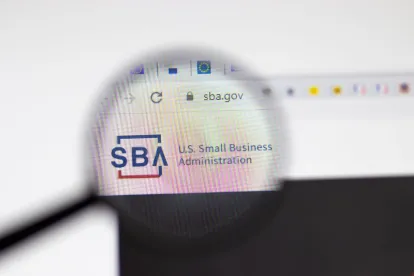The Small Business Administration (SBA) Final Rule on Veteran-Owned Small Business (VOSB) and Service-Disabled Veteran-Owned Small Business (SDVOSB) Certification (the Final Rule) takes effect on January 1, 2023. The majority of the changes made by the Final Rule will be implemented through a new regulatory section in SBA’s regulations, which will be located at 13 C.F.R. § 128. Any business intending to seek government contracts that are set aside for VOSBs or SDVOSBs should closely review this significant Final Rule.
Prior to the Final Rule taking effect on January 1, 2023, entities competing for SDVOSB set-aside and sole-source contracts through SBA’s programs, outside of the Department of Veterans Affairs (VA), have been permitted to self-certify their status. Only those contractors intending to compete for SDVOSB or VOSB contracts through VA’s Veterans First Contracting Program have been required to obtain verification of their qualified status through VA’s Center for Verification and Evaluation (CVE). However, as a result of the Final Rule, SBA is assuming control of the VOSB and SDVOSB certification process for purposes of nearly all small business federal contracting, and self-certification for VOSBs and SDVOSBs is being eliminated, except for self-certifications for subcontracts and for goaling purposes. These changes are important for all VOSBs and SDVOSBs competing for federal contracts.
Entities Seeking VOSB and SDVOSB Set-Aside Contracts and Sole-Source Awards Must Receive Certification
Which Entities Must Comply with the Final Rule?
The Final Rule applies to any business seeking an award of a VOSB or SDVOSB set-aside or sole source federal government prime contract.
In general, a VOSB is a small business that is at least 51 percent owned and controlled by a veteran. Likewise, a SDVOSB is a small business that is at least 51 percent owned and controlled by a service-disabled veteran.
Notably, the Final Rule expands VOSB and SDVOSB certification eligibility beyond a contractor’s primary NAICS code. Before January 1, 2023, only firms that were small in their primary NAICS code were considered eligible for certification as VOSBs or SDVOSBs. The Final Rule, however, eliminates this requirement and will allow a business to be certified as a “small business” for purposes of being a VOSB or SDVOSB so long as it is “[a] small business concern as defined in [13 C.F.R. § 121] under the size standard corresponding to any NAICS code listed in its SAM profile.” Therefore, under the Final Rule, so long as a contractor is small under any NAICS code that is listed in its SAM profile, it will meet the definition of “small business” that is required for certification as a SDVOSB or VOSB, which is broader than the pre-Final Rule regulations that required the business to be small for its primary NAICS code. Separate from the entity’s SBA certification, however, to be eligible for a specific SDVOSB/VOSB set-aside contract, the certified contractor must also qualify as a small business under the size standard corresponding to the particular NAICS code that is assigned to that specific contract. Accordingly, even a certified SDVOSB will not be eligible for a particular contract of its size exceeds the NAICS code assigned to the particular contract for which it desires to compete.
Additionally, SBA’s rules are very strict about what meets the required ownership and control of a VOSB or SDVOSB by the qualifying veteran. The Final Rule’s requirements on ownership and control should closely be reviewed before assuming compliance. For example, a very typical operating agreement provision, such as a quorum requirement, can cause a contractor to be disqualified from these programs if it impedes on the qualifying veteran’s control.
If A Contractor is Currently Verified as a SDVOSB by VA’s CVE, Does The Final Rule Require it to Immediately Get an SBA Certification?
A contractor already verified by VA’s CVE before January 1, 2023 will be deemed certified by SBA during the time that remains in its three-year term of eligibility. In order to be recertified later, a contractor must meet all conditions of eligibility required by SBA’s Final Rule at that time.
In the comments to the Final Rule, SBA has also confirmed that it intends to extend the eligibility of CVE-verified firms for a period of up to one year if the firm’s eligibility period issued by CVE expires during the 2023 calendar year. However, this extension is at SBA’s discretion so contractors who fall into this window should be diligent about the status of their certifications.
How do VOSBs and SDVOSBs Seek the Required Certification?
Beginning on January 1, 2023, contractors seeking VOSB or SDVOSB certification can submit applications and documents for processing on SBA’s website. Similar to the pre-Final Rule CVE process, SBA will require documents and information demonstrating that the applicant is a small business concern that is owned and controlled by one or more qualifying veterans. More information related to the types of documents and information that a business must submit will be released on SBA’s website on or before January 1, 2023. SBA has already issued a Frequently Asked Questions (FAQ) page that addresses several common questions about the Final Rule, and we expect that SBA will continue to update this page through the implementation of the Final Rule.
Upon submission, applicants should receive an acknowledgment message containing the estimated processing time for the application and other information. It is important for applicants to stay vigilant during the application process because SBA may, in its sole discretion, request additional documents and information and may seek clarifications about previously submitted information and documents at any time during the eligibility determination process. Failure to adequately respond to a documentation request shall constitute grounds for a denial of the application.
Moreover, during the eligibility determination process, the applicant must keep SBA informed of any changed circumstances that could affect its eligibility as a VOSB or SDVOSB. For example, any changes in ownership and/or control and changes in size status must be reported.
Notably, where an applicant small business concern already participates in the 8(a) Business Development (BD) Program and the individual upon whom the 8(a) BD Program eligibility is based is also a qualifying veteran, the applicant may use documentation from its most recent 8(a) BD annual review (or its 8(a) BD acceptance if it has not already had an annual review) in support of its application for certification as a VOSB or SDVOSB. Likewise, a business that is already certified by SBA as a Women-Owned Small Business (WOSB) and/or Economically Disadvantaged Women-Owned Small Business, which has its eligibility based on one or more women who are qualifying veterans, also may use documentation of its most recent annual recertification (or of its acceptance into the WOSB program) to support its application to be certified as a VOSB or SDVOSB. SBA will allow this easier path for these entities because the ownership and control regulations for the 8(a) BD and WOSB programs are very similar to the ownership and control regulations for VOSBs and SDVOSBs.
However, an applicant relying on a prior WOSB certification or an 8(a) BD certification, must also certify to SBA that no material changes in ownership and control have occurred.
How Often Must Entities Seek Recertification?
Any firm seeking to remain certified must recertify its eligibility every three years. There is no limit on the number of times a business may recertify so long as it continues to meet the required criteria for the relevant status. A business may recertify within 120 calendar days prior to the termination of their eligibility period. At the discretion of the Administrator (or designee), a business’s eligibility period may be extended up to a period of one year.
Are Contractors Prohibited From Competing for an SDVOSB or VOSB Contract While Their Applications for Certification Are Pending?
Significantly, any entity that submits a complete certification application to SBA on or before December 31, 2023, may continue to self-certify for SDVOSB sole source or set-aside contracts outside of the VA until SBA declines or approves the entity’s application. If an entity fails to submit a timely certification application, the entity will not be permitted to self-certify for SBA SDVOSB sole source or set-aside contracts beginning on January 1, 2024. SBA is implementing this one-year grace period in order to facilitate the transfer of certification responsibilities to the SBA.
Entities also may continue to self-certify their status when competing for either subcontracts or unrestricted contracts under full and open competition. Contracts issued under full and open competition are contracts that are not restricted to VOSBs or SDVOSBs per SBA's programs, but the agencies can still get goaling credit for them if the contract awardee self-certifies that it meets the relevant status. However, SBA anticipates sunsetting this self-certification provision for unrestricted contracts within five (5) years through separate rulemaking.
How does the Final Rule Affect Joint Ventures?
The Final Rule also amends the requirements that a joint venture must satisfy to submit an offer for a contract that is set aside for VOSBs or SDVOSBs. The Final Rule confirms that a certified SDVOSB or VOSB may enter into a joint venture agreement with one or more other small business concerns, or with an approved mentor pursuant to 13 C.F.R. § 125.9, for the purposes of submitting an offer for a SDVOSB or VOSB contract. Interestingly, while VA previously verified joint ventures as VOSBs or SDVOSBs through the CVE, the Final Rule confirms that the joint venture entity itself need not be certified by the SBA as a VOSB or SDVOSB. So long as the joint venture meets the requirements of the forthcoming 13 C.F.R. § 128.402, which includes having a certified VOSB or SDVOSB as a managing member whose status corresponds with the type of award, the joint venture may submit an offer for a VOSB or SDVOSB contract. Moreover, at the time of the offer, each certified VOSB or SDVOSB joint venture partner must certify to the contracting officer under its own name that: (1) it is a certified VOSB or SDVOSB; (2) that it, together with its affiliates, is small under the applicable size standard; and (3) it will comply with the applicable limitations on subcontracting rules as set forth in 13 C.F.R. § 125.6.
Significantly, similar to SBA's other joint venture regulations, the joint venture agreement itself also must include the content required by SBA’s regulations for VOSB/SDVOSB joint ventures, which will be included in the forthcoming 13 C.F.R. § 128.402(c). These regulations governing the content of joint venture agreements must be closely reviewed to ensure that every required provision is included.
Conclusion
The Final Rule, effective January 1, 2023, will make significant changes to VOSB and SDVOSB certifications and compliance, which should be closely reviewed by all government contractors seeking those certifications.




 />i
/>i
